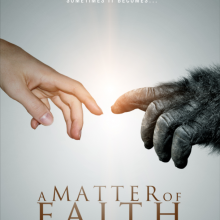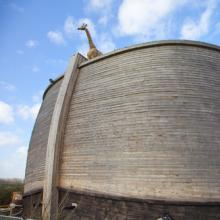creationism
ON A RECENT morning run, I saw a yard sign that began, “We believe ...” and included a list of creedal-like commitments. One stood out: “Science is real.”
Science? I thought. Does belief in science really need front-yard creedal affirmation?
One trend of the recent divisions in our nation is a heightened distrust in science among evangelicals and the Religious Right. This pattern has been acute during the COVID-19 pandemic, when research by epidemiologists and other members of the scientific community has been increasingly called into question by conservative pundits, political officials, and religious leaders. The costs of this rhetoric and its effects have grown far beyond alarming.
Where did this science and religion rift come from? And how can we speak into the fear and mistrust in the work of science that has taken root in recent years in a way that cultivates trust and encourages mutual concern?
The origins of this rift are not easy to trace, fed as they are by a variety of sources. Thomas Dixon, in the book Science and Religion: A Very Short Introduction, attributes the science-religion conflict narrative to three sources: Enlightenment rationalists in the late 1700s, Victorian “free-thinkers” in the mid-1800s, and modern-day scientific atheists at the end of the 1900s to the present. “Few things make thinking like a scientist more difficult than religion,” wrote Sam Harris, a prominent atheist, in The New York Times in 2009.
Great numbers of contemporary Christians have arrived at the opinion that their faith tenets and the work of science are in conflict, though this is far from a homogenous view. According to Pew Research Center analysis of data from the Wellcome Global Monitor, there is a wide variation in views among global Christians on the relationship between science and religion. Christians in the U.S., for example, far exceed Christians in other parts of the world in reporting that science has conflicted with their religion’s teachings: 61 percent of U.S. Christians reported such conflict, compared to 22 percent in Singapore, 18 percent in Sweden, and 12 percent in the Czech Republic. According to the National Association of Evangelicals, evangelicals in the U.S. are more than twice as likely as the general public (29 percent vs. 14 percent) to hold the view that science and religion are in conflict.
At the same time, for many other Christians science represents a path toward God, not away. “Doing science to me is a search for God,” George Coyne, a Jesuit priest, astronomer, and former director of the Vatican observatory told On Being podcast host Krista Tippett. “And I’ll never have the final answers, because the universe participates in the mystery of God.”
The growing distrust in science among some people of faith has become a matter of life and death during the COVID-19 pandemic. White evangelical Christians represent the highest rates of vaccination hesitancy among religious groups in the United States. How, then, are we to engage our neighbors, aunts, brothers, or parents in a way that counters misinformation and rebuilds trust?
After a quarter-century, the Rev. Barry Lynn is retiring as head of Americans United for Separation of Church and State.
In court, in congressional hearings, and on cable television, Lynn has led the fight against school-sponsored prayer, religious symbols on public property, and any law that allows government to privilege people of faith.
Science and education professionals are increasingly alarmed about the impact Donald Trump’s cabinet picks — many of them evangelical Christians — could have on science standards in public schools.
Candidate Trump repeatedly pledged to end the existing Common Core curricula standards for math and English. Critics worry that could open the door to rethinking science standards, and lead to the teaching of creationism and Intelligent Design, pseudo-scientific notions about Earth’s origins with little or no support from scientists.

Image via MSSA / Shutterstock
Creationist Christian tourists may soon flock to the Ark Encounter, a literal vision of Noah’s story in Genesis come to life in July as a theology-packed tourist attraction in Williamstown, Ky.
In the past few months I have come to a rather substantial conclusion: I cannot slow down time. Try as I might, my oldest daughter is now four and a half and is practically sprinting her way to "big kid school." My wife and I have been discussing this next phase of our daughter’s life. Sadly, school districts are falling into massive debt, being subjected to low performance in the classroom and even apathy in educating the next generation. Schools have become too focused on state test scores and benchmarks and have removed the art of learning from many classrooms.
Now private schools are becoming more mainstream, offering alternatives to public education, more flexibility, and more opportunities to the students. For many private schools there is a common element: they are associated with a religious group or Christian denomination. These schools started out as an extension of the ministry of the church as a way to respond to the needs of the community. But over time many popped up as a rejection of the educational system and their "removal" of God or prayer the school. Many parents see disconnect between the mainstream educational system and their Christian households.
But I see a certain danger in some of these Christian alternatives. It might sound counterintuitive for an ordained Christian minister to say, but there are a few reasons I would not send my daughter to some Christian schools.
Pope Francis on Oct. 27 waded into the controversial debate over the origins of human life, saying the big bang theory did not contradict the role of a divine creator, but even required it.
The pope was addressing the plenary assembly of the Pontifical Academy of Sciences, which gathered at the Vatican to discuss “Evolving Concepts of Nature.”
“When we read about Creation in Genesis, we run the risk of imagining God was a magician, with a magic wand able to do everything. But that is not so,” Francis said.
“He created human beings and let them develop according to the internal laws that he gave to each one so they would reach their fulfillment.”
Francis said the beginning of the world was not “a work of chaos” but created from a principle of love. He said sometimes competing beliefs in creation and evolution could co-exist.
WHEN MARK TWAIN supposedly said “reports of my death have been greatly exaggerated,” he didn’t know he was establishing a tweet for the ages. (He didn’t use Twitter. He was more of an Instagram guy.) It still stands as the best rejoinder to those who insist on seeing things for what they aren’t.
Politically speaking, pundits and legislators alike were guilty of prematurely identifying the cold carcass of the tea party last spring when establishment Republicans defeated their right-wing rivals in several primaries. Then came Eric Cantor who, as a Jew, never really fit the profile of an evangelical Christian, the preferred qualification for tea party membership. But as majority leader of the House, he was powerful and occasionally clear-spoken, two other characteristics not often found in tea party favorites.
Nonetheless, Cantor went down to defeat at the hands of an underfunded college professor whose only apparent advantage was a more-evangelical hair style. But his secret weapon was his intolerance for undocumented workers, a favorite position for tea party Americans whose food is harvested almost exclusively by undocumented workers. But let’s not quibble. People are entitled to their opinions, even if the food on their plates sits in mute repudiation of those beliefs. (Luke said “the stones will cry out,” but I’d be happier if a bowl of vegetables would just stand up and say a few cryptic words before dessert.)
So now Eric Cantor’s political career is over, and he moves on to the pitiable life of a wealthy lobbyist who, through no fault of his own, must replace a deep sense of social responsibility with a couple really nice cars. Better that than the consequences for Cantor’s pollster, who predicted a 34 percent victory for his boss. (“Clean-up on aisle 12.”)
AS THIS IS written, the big, fat Hollywood blockbuster Noah is opening amid condemnation from some Muslims and evangelical Christians and praise from most film critics.
Today, any product that touches the Bible is bound to be perceived as another entry in the culture wars. But that doesn’t seem to be what the producers and filmmakers had in mind with Noah. After all, it’s time-tested public domain material that presents great opportunities for computer-generated imagery (CGI) special effects. Paramount, the studio that put up the $125 million production cost, mostly wanted to peel off a slice of the Christian audience that flocked to Mel Gibson’s The Passion of the Christ and the History Channel’s Bible series.
But Noah was a culture war surrogate long before Russell Crowe donned his biblical robes. That’s because the creationist organization Answers in Genesis (AiG), which runs an anti-evolution Creation Museum in northern Kentucky, has for the past few years been trying to raise money to build a theme park anchored by a Bible-sized replica of Noah’s Ark. The Creation Museum is famous for such attractions as exhibits that depict humans and dinosaurs as neighbors. You may have heard it described as the museum for people who think The Flintstones was reality TV.
It’s a big job rebuilding Noah’s ark. The makers of the movie Noah only built to about a third of the biblical dimensions and used CGI for the rest. The price tag for the one planned in Kentucky is about $73 million. Early on, the project got a surprising boost from Kentucky’s governor, Democrat Steve Beshear. You may have seen Beshear on TV recently hyping Kentucky’s rollout of the Affordable Care Act. But before that, in 2010, Beshear came in for rounds of derision when he announced that our state would give $37 million in tax breaks to the ark attraction, as an economic development measure. When—or if—completed, the park is supposed to create 900 jobs and bring $250 million into Kentucky in its first five years.
In just the latest evidence that a certain subset of conservative evangelical Christians really has no interest in occupying the real world with the rest of us, the trailer for a new movie called A Matter of Faith has hit the Internet.
The film follows the travails of a Christian father, who — horrified by the fact that his daughter’s college teaches the theory of evolution as a fact (gasp!) — challenges the villainous biology professor to a public debate that will no doubt settle the matter once and for all.
If this premise sounds strangely familiar, it could be that you’re remembering God’s Not Dead, a film released in March, in which a Christian student who — horrified by the fact that his philosophy professor is a committed atheist — challenges the dastardly nonbeliever to a debate on the existence of God that, no doubt, settled the matter once and for all.
(I’m told that the new movie was called Christians vs. the Straw Man II: This Time It’s Personal throughout production, before filmmakers decided to rename it A Matter of Faith.)
The similarities between the two pictures don’t stop there.
Every so often, the young-earth groups come up with an idea that is just so plainly, utterly, obviously wrong — in every sense of the word — that it demands a response from a larger subset of believers. To do otherwise would be to make a mockery of the Christ we claim to follow — a man who was hated by the religious establishment of the day precisely because he called them out for their hypocrisy and refused to let them claim divine fiat for their immoral actions.
I'm speaking of the so-called Ark Encounter. If you're not familiar with the project, it's the latest brainchild of Ken Ham (of recent "Ham on Nye" fame) and AiG, a planned "biblical" theme park centered around a scale, wooden replica of Noah's ark, constructed according to the instructions in Genesis (except this one will be built by teams of modern-day professionals rather than a single, unskilled old man, won’t be seaworthy, and won’t hold two of every unclean animal and 14 of every clean one).
Ham and his team have been discussing these plans for years, but few outside their devoted following paid them much heed till now, probably because the project’s well-publicized funding issues led us all to believe the thing would never be built. But, according to a statement by Ham last week, enough investors are on board to “start” construction on the 510-foot-long, boat-shaped building. The cost of completing the first phase of the theme park has been estimated at more than $70 million.
There was a moment during last week’s “debate” between Bill Nye the Science Guy and young-earth creationist Ken Ham that I think was more telling than any other.
During the Q&A session, Ham was asked what seemed to me to be a very simple question: “Hypothetically, if evidence existed that caused you to admit that the universe is older than 10,000 years and creation did not occur in six days, would you still believe in God, and the historical Jesus of Nazareth, and that Jesus was the son of God?”
What was most telling was not really what Ham said, as much as what he didn’t say, which was “Yes.”
In my mind, this question was a softball pitch. It couldn’t possibly be easier. And Ham was given two minutes to answer the thing? His response should have taken all of two seconds: “Yes.”
If you perused some of the headlines coming out of Slate the past couple weeks, you’ll find that, not only are Texas schools teaching creationism , schools all over the country are teaching creationism , and — even as we speak — lawmakers in South Dakota and elsewhere are introducing legislation that will let their schools teach creationism.
Such news leads me to one of two conclusions: Either the proponents of teaching creationism — a viewpoint I thought it was ruled unconstitutional by the Supreme Court in 1987 — have been very busy lately, or what passes for “creationism” in the eyes of the mainstream media these days has become pretty fuzzy.
I lean toward the latter.
Look, I’m a writer and a journalist, too. I get it. I understand the desire for a sexy, emotionally heavy word that “seems” to describe the given topic and will — of course — generates millions of clicks from the churning, polarized body politic that powers the Interwebs.
But this willy-nilly misapplication of the terms “creationist” and “creationism” simply has got to stop, and here’s why.
There’s a lot at stake here. By trying to turn the Jewish poetry of the Genesis story into a scientific-historical text that would stand against evolution, Creationism, as an ideology, serves to diminish the account of human dignity established in the Creation story that might, in fact, represent a worthy alternative to Darwinism. Says [Marilynne] Robinson: “People who insist that the sacredness of Scripture depends on belief in creation in a literal six days seem never to insist on a literal reading of ‘to him who asks, give,’ or ‘sell what you have and give the money to the poor.’ In fact, their politics and economics align themselves quite precisely with those of their adversaries, who yearn to disburden themselves of the weak, and to unshackle the great creative forces of competition. The defenders of ‘religion’ have made religion seem foolish while rendering it mute in the face of a prolonged and highly effective assault on the poor.”












